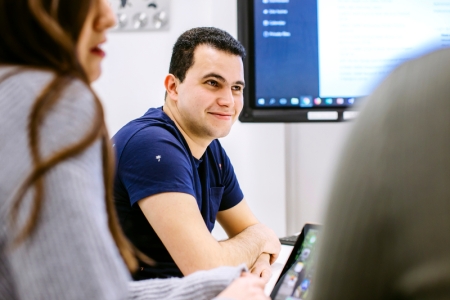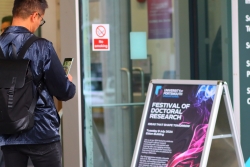
Sidebar navigation

Inspiring postgraduate researchers
Home to an exceptional research community
The University of Portsmouth Graduate School is home to a community of more than 1,000 research degree students across our 5 faculties.
Whether you're studying for a PhD, MPhil, MRes, MD, Professional Doctorate or PhD by Publication, the Graduate School can help you through every aspect of your research degree, from admission, registration, submission of your thesis, to your viva voce examination.
The Graduate School is where you'll find bespoke training and professional development courses to grow your research career – and is your first port of call for student and supervisor guidance and support, and for the latest postgraduate social and academic events.
Learn more about us - read blog posts from the Graduate School
Research degree registration and induction
Your postgraduate study at Portsmouth begins each year with registration. After registration you'll receive your student ID card, which gives you access to the University Library, and a University of Portsmouth computer username and password.
We arrange an introductory programme to help you make rapid progress with your studies and is compulsory for all new postgraduate research degree students. We run our induction events throughout the year in-person here in Portsmouth for full-time (FT) and part-time (PT) campus-based students and online for distance learning (DL) students.
- October In-Person (2 days for FT and PT - details sent in September)
- October Online (3 hour evening session for DL - details sent in September)
- February In-Person (2 days for FT and PT - details sent in January)
- February Online (3 hour evening session for DL - details sent in January)
- April (1/2 day hybrid FT, PT and DL - details sent in March)
The induction will provide you with:
- An opportunity to meet other research degree students.
- Introductions to the key personnel involved in the Graduate School.
- An understanding of what is different about doctoral level postgraduate study and how to prepare for it.
- An introduction to the Graduate School Development Programme and events.
Your faculty and/or department will also organise local welcome events. Before arriving at the University, you will be invited to attend these introductory events. If you require more details about induction, please contact your departmental office or the Graduate School at graduate.school@port.ac.uk.
Postgraduate researcher training
Our Graduate School Development Programme (GSDP) offers free online and in-person training, workshops and special interest groups covering topics such as research design, doctoral process and career development. They're delivered by our expert tutors, and support students at all stages of their research degrees.
Our online training also covers doctoral process and skills for researchers, and these self-paced resources contribute to the 10 annual days of research development activities (5 days for part-time students), that we expect you to complete.
For more information on our training and development, visit our Graduate School training for PGR students webpage.

There is massive support and resources available through the supervision team, Library and Graduate School. I have learned a lot through the training courses provided by the Graduate School, which I attended almost daily
Mahmoud Elmarzouky, PhD Accounting and Financial Management
Supervisor training
The Graduate School also offers training and support for your supervisory team, to make sure that your supervisors have the skills and knowledge to support you through your research degree from start to finish.
Events
The Graduate School holds various events throughout the year to enhance your research degree experience with us including our 3-day Thesis Boot Camp, the Festival of Doctoral Research and other special interest events. More information on these events can be found on our Graduate School Eventbrite page.
Vitae
Vitae is the global leader in supporting the professional development of researchers, working with universities globally striving for innovation, impact and research excellence. They provide some extremely useful advice on getting started with your PhD, including a downloadable professional development guide for new researchers. It also organises interactive Google hangouts with leading research professionals as well as useful advice on getting started, planning your time and developing your skills as a researcher. Visit the Vitae Website.
Graduate School blogs
See all Graduate School blogs
Celebrating success: social media highlights from our postgraduate research graduations

Eldon Building buzzes with innovative research at the Festival of Doctoral Research 2024!

Celebrating Pride Month 2024: A Conversation with PhD Student Kris Nolan on LGBTQ+ Activism



